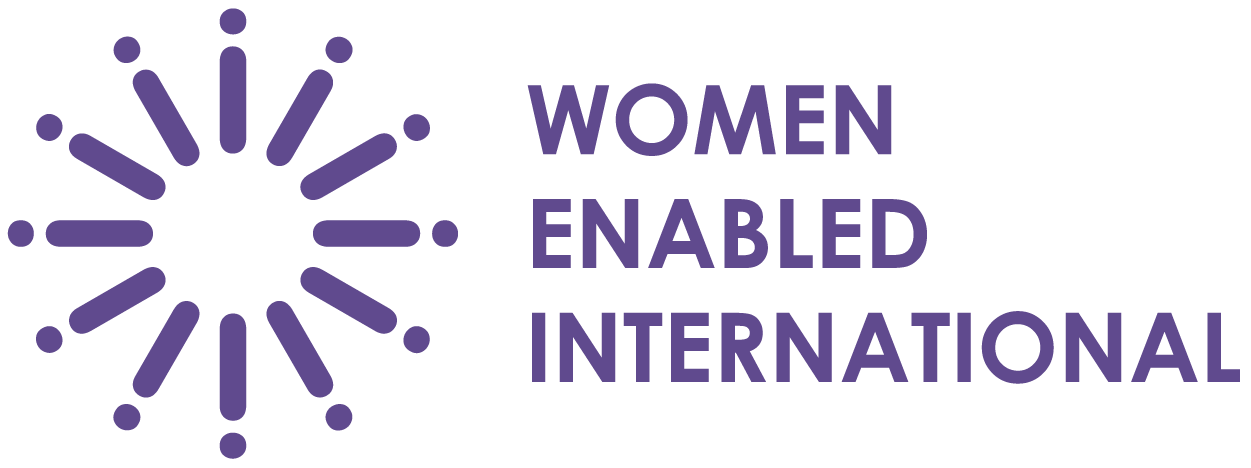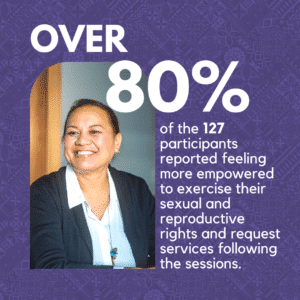
Our outreach and awareness-raising efforts led to over 80% of the 127 participants reporting that they felt more empowered to exercise their sexual and reproductive rights and request services following the sessions. The pilot also underscored the pervasive need for more programming at the community level.
For example, we found…
In the Western region:
- 7 out of 10 participants had never received information on family planning, safe motherhood, and healthy relationships.
- 9 out of 10 participants had never visited a clinic or seen a doctor to ask for information and seek services relating to sexual health, family planning methods, and healthy relationships.
- Only 41% of the participants knew that women with disabilities have the right to choose their partners.
“The training was very useful as it provided health workers with a better platform on how best to provide assistance and services for persons with disabilities…, treating them as any other human being, instead of seeing them as objects of charity or a ‘special-case’”
—A healthcare worker who joined the awareness session on disability-inclusion
WEI looks forward to building on the success of this pilot in partnership with our partners* to strengthen the capacity of individuals living at the intersection of gender and disability to know their rights and for communities to provide accessible and appropriate health services.
* This project is supported under the UNFPA Pacific’s Transformative Agenda for Women, Adolescents and Youth in the Pacific program funded by the Australian Department of Foreign Affairs and Trade (DFAT).
Related Resources
Groundbreaking Research and Resources: WEI’s Work in the Pacific
Know Your Rights! Gender-Based Violence during the COVID-19 Pandemic in the Pacific Region
Your Voice Counts!
WEI’s first-ever community survey set out to learn more about advocates and allies in our network and the issues that matter most to you all. We are excited to report some preliminary data:
- 157 people in 46 countries responded (to date)
- 58% of those who responded identify as a person with a disability
- 13% are a family member of a person with a disability.
- 41% Identify as being from the Global South.
Survey participants also ranked the issues they’re concerned about, which will help guide our planning for future priorities and programs.
Thank you to everyone who has shared their stories and insights with us. If you missed it or are new to our mailing list, you can find the survey here (bit.ly/WEICommunity)! We value your input!
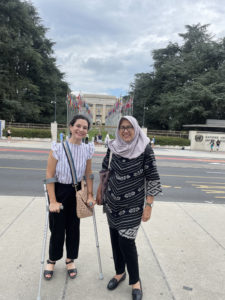 In August 2022, WEI traveled to Geneva for the first time since the start of the COVID-19 pandemic for an in-person session of the Committee on the Rights of Persons with Disabilities (CRPD Committee). We sponsored a colleague from the Indonesia Mental Health Association to participate in the CRPD Committee’s country review of Indonesia and adjacent meetings. The results of these joint advocacy meetings were:
In August 2022, WEI traveled to Geneva for the first time since the start of the COVID-19 pandemic for an in-person session of the Committee on the Rights of Persons with Disabilities (CRPD Committee). We sponsored a colleague from the Indonesia Mental Health Association to participate in the CRPD Committee’s country review of Indonesia and adjacent meetings. The results of these joint advocacy meetings were:
- Drawing particular attention to violations of the rights of women, girls, and gender minorities with psychosocial disabilities, concerns that were reflected in the Committee’s concluding observations which called on the Indonesian government to address such abuses.
- Securing a long-sought meeting by Indonesia Mental Health Association with the Ministry of Social Affairs, which led to…
- Persuading the Ministry to conduct a joint site visit to an institutional facility to observe concerning conditions and take necessary follow-up steps to address them.
Increasingly, WEI is working side-by-side with our partners to effectively advocate with international human rights bodies and also to keep the pressure on at the country level to hold governments accountable for upholding rights at the intersection of gender and disability.
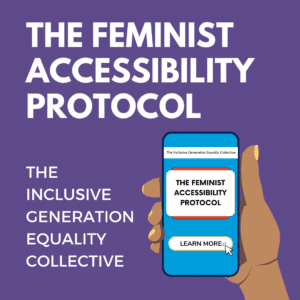
The Protocol is a historic initiative that asks States, feminist civil society, United Nations entities, and other actors to pledge to ensure that, moving forward, gender equality discussions and decision-making spaces are fully accessible to and inclusive of women, girls, trans, intersex and nonbinary persons with disabilities. Each of the 13 pledges in the Protocol is a call for action on a specific aspect of accessibility and inclusivity in feminist events and meetings, including event planning, execution, and follow-up.
To date, over 100 parties have signed on, including notable conveners like Women Deliver, AWID, and CREA.
Click here to read the full protocol, sign on, and share it with your organization and networks.
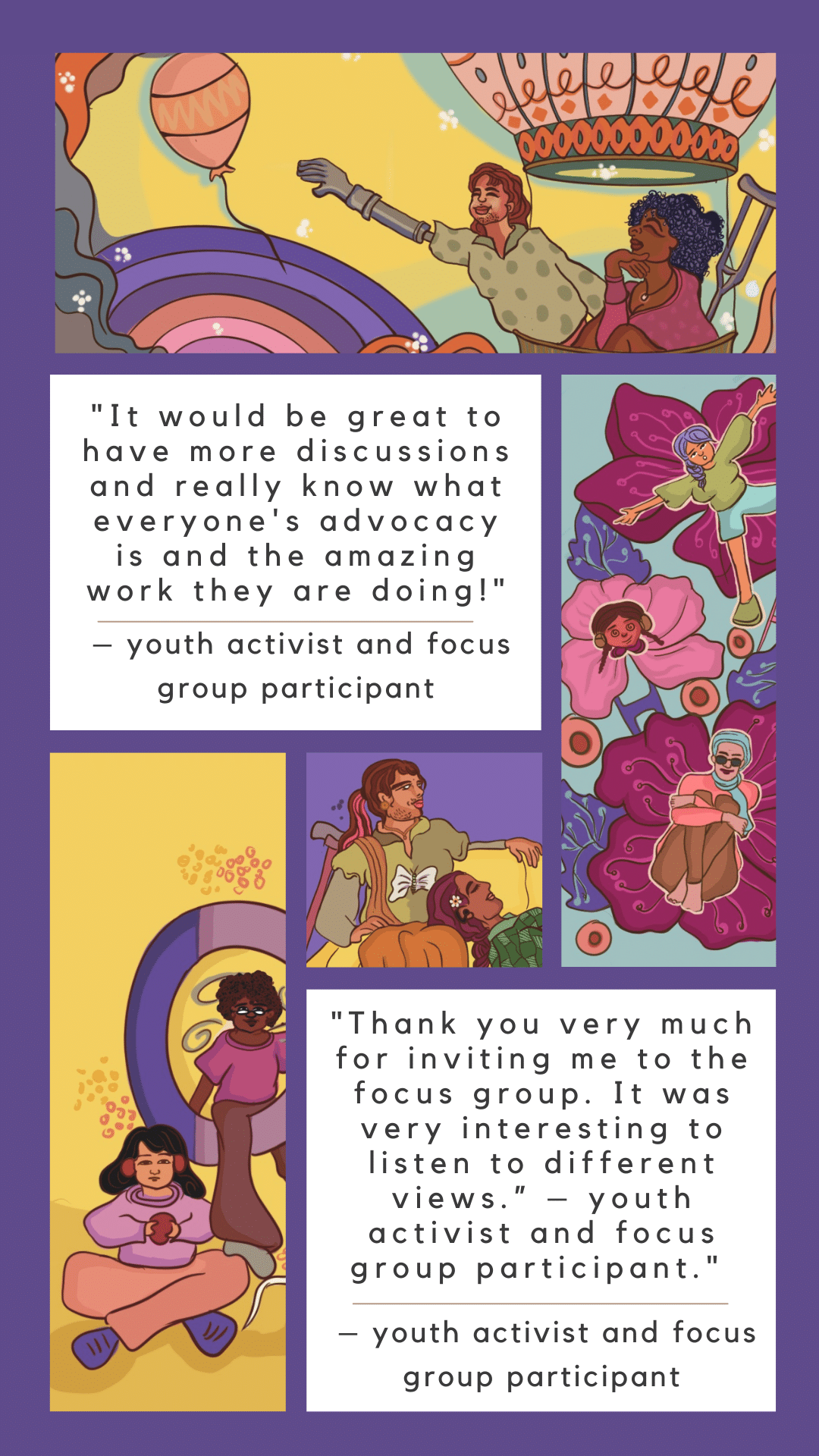
In collaboration with 12 youth advocates with diverse disabilities from the US, Canada, Latin America, UK, Africa, India, Australia, New Zealand, and the Pacific, WEI undertook a project to adapt key resources about human rights at the intersection of gender and disability into more youth-friendly formats. Through surveys and a series of focus group consultations, we asked young people about the topics that interest them, their approaches to activism, and the most effective formats and channels for reaching their peers.
“Thank you very much for inviting me to the focus group. It was very interesting to listen to different views.” – youth activist and focus group participant
“It would be great to have more discussions and really know what everyone’s advocacy is and the amazing work they are doing!” – youth activist and focus group participant
The young people’s feedback led to the creation of two new WEI learning resources in formats tailored for a younger audience: a digital action pack and an interactive online glossary, now available on the WEI website:
Interactive Glossary: https://womenenabled.org/glossary/
Digital Action Pack: https://womenenabled.org/digital-action-pack/
These dynamic, digital, accessible, and youth-friendly tools will help empower new and emerging activists around the globe who are looking to advance disability rights and/or gender rights from an intersectional lens. This project was made possible through a Strategic Partnership Grant from the Disability Rights Fund, and WEI is excited about the potential for these to serve as a springboard for supporting and amplifying youth activism in our global movement.
“We are confident that WEI together with youth activists have produced useful, interactive and dynamic youth friendly resources. We look forward to promoting these resources” – Christina Parasyn, Technical Assistance Director, DRF/DRAF
WEI Stephanie Ortoleva Legal Internship
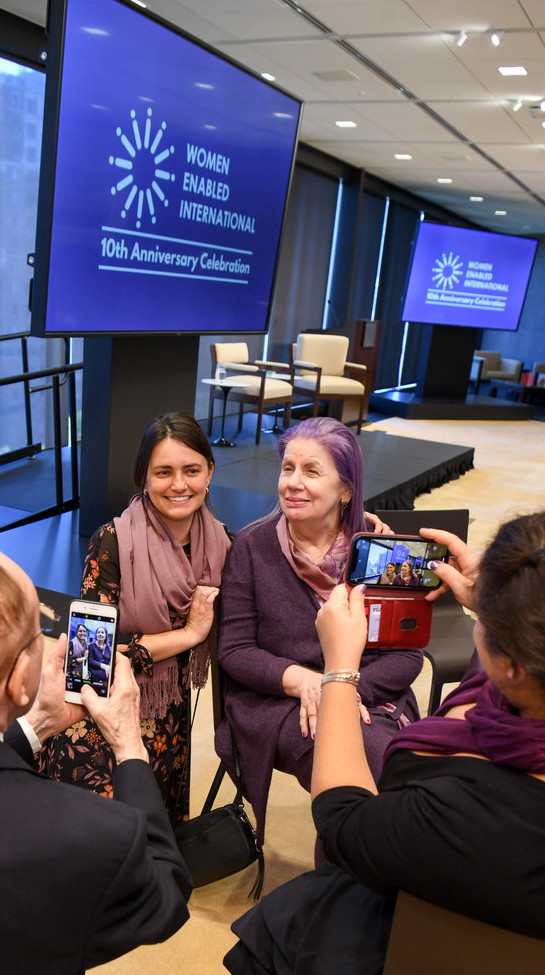
The Stephanie Ortoleva Legal Internship is an extraordinary opportunity for law students to immerse themselves in the world of human rights at the intersection of disability and gender. The internship is proudly hosted by Women Enabled International (WEI) in honor of our pioneering founder, Stephanie Ortoleva.
About the Internship:
This paid internship provides talented law students the chance to be part of the WEI program team for a ten-week immersive experience. This is an extraordinary career opportunity to work with the first – and still only – international organization dedicated to advancing intersectional gender and disability rights globally.
WEI Interns develop professional skills with substantive responsibilities that contribute to WEI’s legal research, U.N. advocacy, movement building, and capacity-strengthening initiatives. They will engage with and advance legal advocacy strategies around key issues identified by women and gender-diverse individuals with disabilities, including sexual and reproductive health and rights, gender-based violence, humanitarian emergencies, community-based living, and feminist disabled leadership,
Eligibility:
WEI welcomes law students – and encourages applicants – from all corners of the world.
The internship is remote and open to law students who have completed at least 30% of their legal studies by the internship start date. What matters most is your unwavering commitment to human rights, disability justice, and gender rights.
Proficiency in English is required, with the ability to work remotely during Eastern Time Zone business hours. Start dates of the internship are flexible to enable alignment with diverse international university schedules.
Knowledge of other UN languages or sign language is a plus.
We encourage individuals with lived experience of disability to apply, and we are committed to providing reasonable accommodations to support the successful candidate.
Compensation:
As a paid intern, you will receive $7,000 (seven thousand U.S. dollars) for your work over 10 weeks (350 hours).
Application Process:
Applications are now closed. Successful applicants will be contacted shortly. Please come back in September 2025 for updates on next year’s recruitment process.
Application Info-Session Video:
Guidelines for Providing Rights-Based and Gender-Responsive Services to Address Gender-Based Violence and Sexual and Reproductive Health and Rights
Women and Young Persons with Disabilities: Guidelines for Providing Rights-Based and Gender-Responsive Services to Address Gender-Based Violence and Sexual and Reproductive Health and Rights aims to provide practical and concrete guidelines for making GBV and SRHR services more inclusive of and accessible to women and young persons with disabilities and for targeting interventions to meet their disability-specific needs.
The Guidelines were created by Women Enabled International and the United Nations Population Fund and were funded by the Government of Spain. The publication officially launched on Wednesday, November 28, 2018.
Direct links to view the PDF version of the Guidelines in your browser and download to your computer:
Watch our Senior Legal Advisor, Anastasia Holoboff, share the Guidelines during a Power Talk at Women Deliver in 2019:
The undersigned disability organizations are outraged and gravely concerned by today’s Supreme Court decision. The Dobbs v. Jackson Women’s Health Organization decision issued today will have devastating consequences. This decision overturns Roe and Casey and eliminates any federal right to abortion. In doing so, it puts many disabled people, particularly Black people, Indigenous people, and other people of color, LGBTQIA+ folks, immigrants, survivors of sexual assault, poor people, and our allies at risk for forced childbirth, death, criminalization, and other physical, emotional, and material harms.
People with disabilities have the fundamental right to make decisions about our lives and bodies. For women and other persons with disabilities who can become pregnant, this includes the right to decide whether or not to continue a pregnancy. People with disabilities are more likely to experience sexual assault, and people with some disabilities face increased and serious health risks from pregnancy. Disabled people need and deserve access to affirming and accessible reproductive health care services, including abortion.
Today’s Supreme Court decision also has far reaching consequences beyond abortion. This decision and its consequences should concern everyone invested in the constitutional rights to work, marry, have and raise children, and make personal decisions without governmental interference. It limits the zone of privacy as the decision drastically narrows the scope of rights protected by the Fourteenth Amendment’s Due Process Clause. At the core of the Dobbs v. Jackson decision is a disagreement with a series of landmark Supreme Court decisions, including those following Griswold v. Connecticut, 381 U.S. 479 (1965).
The decision upends a core value at the heart of American life and law: that we each enjoy the individual liberty to make certain personal decisions without government interference. The very lives of disabled people depend upon the ability to make personal decisions without interference – including decisions about our bodies and medical care. Decimating any aspect of this freedom is cruel, and undermines any claim by those who made this decision that they value privacy and liberty.
This decision also severely weakens stare decisis. With the weakening of stare decisis, the Supreme Court could decide to overrule existing legal precedent at any time, obliterating rulings that have been considered settled for generations. These drastic upheavals are severely detrimental to people who depend on the courts to enforce their civil rights, including disabled people and other historically marginalized groups.
Today’s case has far-reaching consequences. The majority’s opinion puts bodily autonomy and individual liberty in decision-making at risk and may have consequences that affect personal rights surrounding marriage, family planning, intimacy, sterilization, medical care, housing, speech, and more. This ruling is at odds with the Court’s previous decisions about personal autonomy and privacy over the last several decades. We cannot wait for a future Supreme Court to reverse this devastating decision. Congress must act to protect these important rights.
To protect our communities, we stand united in our opposition to this opinion and its unjust result. Our rights – and the rights of countless Americans – depend on it.
Signed,
American Association of People with Disabilities
Autistic Self Advocacy Network
Autistic Women and Nonbinary Network
Bazelon Center for Mental Health Law
Be A Hero
Center for American Progress
Disability Rights Education and Defense Fund Little Lobbyists
Women Enabled International


Women Enabled International is deeply distressed by the Supreme Court of the United States’ decision in Dobbs v. Jackson Women’s Health Organization today, which overturns a nearly 50-year legal precedent and eliminates a federal right to abortion in the United States. As a result of this decision, abortion could become illegal or severely restricted in over half of U.S. states and territories, with devastating consequences for the lives and health of more than 40 million women and other people with the biological capacity to become pregnant.
Abortion is essential health care to which women and gender minorities—with and without disabilities—need safe and legal access in order to exercise control over our bodies and lives, live with dignity, and achieve full recognition of our personhood. Restrictions on access to abortion have a disproportionate impact on the lives and well-being of women and gender minorities with disabilities.
For example:
· Pregnant persons with disabilities may face significant health impacts and complications from pregnancy, including as a result of their impairments, and so may require access to abortion to ensure protection for their own health and lives.
· Persons with disabilities are at heightened risk of sexual violence and abuse; being forced to continue an unwanted pregnancy that results from that abuse may have significant mental and physical health impacts.
International human rights law affirms a right to reproductive autonomy and freedom. The realization of this right should not be contingent upon where we live. The Supreme Court’s decision, however, effectively requires a significant portion of the population to travel out of state to be able to exercise this right. Pregnant persons with disabilities face significant financial and logistical barriers to traveling to another jurisdiction to obtain an abortion, as travel may be too expensive, the means of travel may be inaccessible, and they may require a support person or interpreter to undertake such travel. Furthermore, some people with disabilities have trouble accessing needed information due to the inaccessibility of the way the information is presented or lack of financial resources for Internet access. This further complicates their ability to access out-of-state abortion care.
As a result of these significant barriers, pregnant persons with disabilities—particularly those who experience multiple forms of marginalization due to race, ethnicity, sexual orientation, gender identity or expression, age, or other statuses—will be denied their right to essential reproductive health care. As we have seen globally, people who cannot access legal abortion may resort to unsafe and/or clandestine abortions, with attendant risks to life and health, in addition to the threats of criminal charges.
The impact of this decision will be felt deeply across the United States and around the globe. WEI is committed to working in partnership with disability and reproductive rights and justice organizations across the country to mitigate the harmful effects of this decision on our community and to ensure that the voices and perspectives of women and gender minorities with disabilities are included in this important fight for our human rights.
In addition to WEI’s ongoing work to bring an intersectional gender and disability lens to discussions and advocacy around abortion rights, in the coming months we plan to:
· Give guidance to abortion funds about how to ensure that funding reaches and is inclusive of women and gender minorities with disabilities.
· Develop and disseminate accurate information about the impact of the Dobbs decision in accessible formats.
· Bring the learnings from our sisters in other countries who have participated in their countries’ movements for abortion rights to inform the longer-term response of U.S. disability rights and justice actors to this human rights crisis.
Today’s decision is a significant attack on our fundamental rights, and we share the pain, anger, and exhaustion that so many of you feel. But while this marks the end of an era in abortion rights in the United States, the fight does not end here—WEI remains committed to engaging in strategic and collective advocacy to reclaim our right to bodily autonomy.
